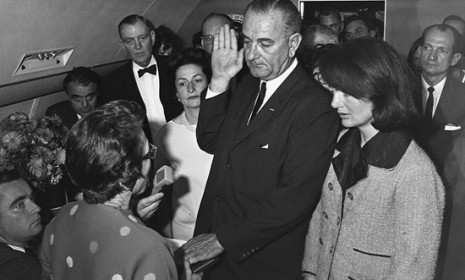Robert Caro's gripping LBJ biography: 5 revelations
Caro's eagerly awaited fourth tome on Johnson's life and career comes out in May, and The New Yorker is running a long, riveting exerpt

A free daily email with the biggest news stories of the day – and the best features from TheWeek.com
You are now subscribed
Your newsletter sign-up was successful
Historian Robert Caro has been meticulously documenting Lyndon B. Johnson's life for more than three decades, and with his fourth weighty LBJ volume, The Passage of Power, due out May 1, the Pulitzer–winning biographer has published a long sneak preview in The New Yorker. The excerpt, in the April 2 issue of the magazine, recounts perhaps the most fateful day in Johnson's life, and among the most traumatic for the country — the assassination of President John F. Kennedy on Nov. 22, 1963 — from LBJ's perspective. Here, five key revelations from Caro's "gripping new essay":
1. LBJ was convinced his career was over
The morning JKF was assassinated, Johnson had good reason to fear that he wasn't going to be vice president in a second Kennedy term. A Washington scandal was heating up involving an LBJ protégé, Bobby "Little Lyndon" Baker; a gaggle of Life reporters was plotting an exposé on Johnson's murky personal wealth; and the morning's newspapers were full of his humiliating failure to mend a rift between two of his home state's top Democrats, Gov. John Connally and Sen. Ralph Yarborough. LBJ had "apparently convinced himself" he was "finished," Caro writes, and "given what the president himself was seeing in Texas," JFK's "assurances that he would be on the ticket might have started to ring hollow."
The Week
Escape your echo chamber. Get the facts behind the news, plus analysis from multiple perspectives.

Sign up for The Week's Free Newsletters
From our morning news briefing to a weekly Good News Newsletter, get the best of The Week delivered directly to your inbox.
From our morning news briefing to a weekly Good News Newsletter, get the best of The Week delivered directly to your inbox.
2. He was pinned by a Secret Service agent
Riding two cars behind Kennedy and Connally in the fateful Dallas motorcade, seated awkwardly next to Yarborough, LBJ "got a foretaste of what might lie ahead if he remained vice president," Caro writes: "Five years of trailing behind another man, humiliated, almost ignored, and powerless." But all that changed, of course, when Kennedy was shot. After the gunshots rang out, Secret Service agent Rufus Youngblood threw Johnson to the floor of the car and covered him with his body. LJB rode that way, calmly, all the way to the hospital.
3. After the assassination, LBJ took charge
Years earlier, when LBJ "traded in the power of the Senate Majority Leader, the most powerful Majority Leader in history, for the limbo of the vice presidency," his whole demeanor changed, Caro reports. His shoulders had stooped, he developed a "hangdog look," and he was restless and fidgety. But on that fateful day in November 1963, as soon as top Kennedy aide Ken O'Donnell told LBJ that the president had died, everything changed. "Right then," LBJ ally Rep. Homer Thornberry said, Johnson "took charge." And everyone knew it.
A free daily email with the biggest news stories of the day – and the best features from TheWeek.com
4. LBJ wouldn't leave for D.C. without the Kennedys
The first big decision Johnson made was that he wasn't going to fly back to Washington without Jackie Kennedy and, by extension, JFK's body. Many worried that the assassination was part of a conspiracy, and that Johnson might be next, so the Secret Service quietly drove him back to Air Force One before the press learned that Kennedy was dead. LBJ's next big decision was getting sworn in as president on the plane, in Dallas. To legitimize the transfer of power, he wanted Jackie Kennedy and top JFK aides in the room when he took the oath.
5. His phone call to RFK fed a "great blood feud"
Before taking the oath, Johnson made a phone call from Air Force One to the attorney general, JFK's brother Robert, who loathed LBJ. Johnson wanted a legal opinion on where to take the oath, and the wording, but he also wanted to mute any criticism from the president's brother. Still, right after "Robert Kennedy had been told that the brother he loved so deeply was dead... he found himself talking to a man he hated," who was asking him how he could "without delay, formally assume his brother's office," Caro writes. Indeed, that bitter call "became a crucial element in the great blood feud" between the two men — "perhaps the greatest blood feud in American politics in the 20th century."
Sources: Daily Beast, New Yorker (subscription required), Politico, USA Today
-
 Buddhist monks’ US walk for peace
Buddhist monks’ US walk for peaceUnder the Radar Crowds have turned out on the roads from California to Washington and ‘millions are finding hope in their journey’
-
 American universities are losing ground to their foreign counterparts
American universities are losing ground to their foreign counterpartsThe Explainer While Harvard is still near the top, other colleges have slipped
-
 How to navigate dating apps to find ‘the one’
How to navigate dating apps to find ‘the one’The Week Recommends Put an end to endless swiping and make real romantic connections